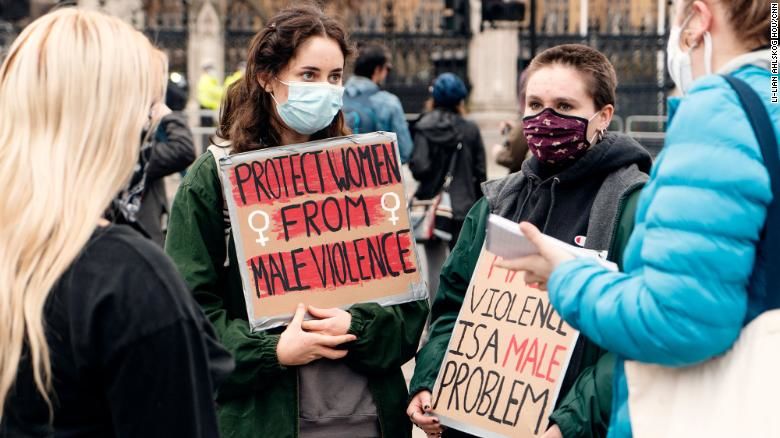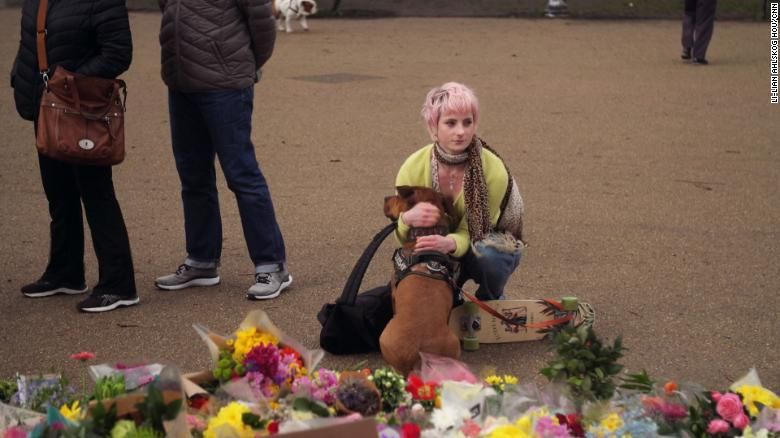
Analysis: The UK is facing a reckoning on gender-based violence. Boris Johnson's government has botched its response
"To get our camerawoman," I reply. "Your cameraman," he corrects me.
"No," I insist. "We are an all-woman team tonight."
For a moment we eyeballed each other. He looked embarrassed.
I was indignant. And he walked off without apologizing for the remark.
It wasn't deliberate. It certainly wasn't dangerous. But it was dismissive.
And, given the setting -- against the backdrop of a women's protest -- it spoke volumes about the national conversation Britain finds itself embroiled in in the wake of Sarah Everard's death.
Exchanges like this happen all over the country, all the time, under less dramatic circumstances than the ones witnessed last weekend.
Whether on the streets, at home, or in the office, what these slights have in common is they erode women's agency in many aspects of their daily lives. The result: it's little wonder that when something as serious as a woman's safety -- not just her status -- is called into question, she often doesn't know where to turn.
Despite years of equality legislation, women are still paid less on average than men in the UK. They face barriers to their careers when they have children and have been at increased risk of redundancy during the pandemic, juggling homeschooling and extra housework.
The UK doesn't just have a problem with women's safety. It has a bigger issue with their value, which allows for a sliding scale of behavior with potential toxic consequences.
Society knows the problem exists, but for some reason, shrugs.

As we saw from Twitter this week, almost every woman appears to have their own anecdotes about previously unreported threatening or lewd behavior.
Those who doubt these stories can always look at the statistics.
A recent survey of 18-24 year-olds by the body "UN Women UK" claimed 97% had experienced some form of unwelcome intimidation in public. Yet convictions for rape dropped to an all-time low in 2020, as the gulf widened between the number of reported cases and those that finally made it to court.
In response to the ire generated by the Everard case, the government has cobbled together a rather limited set of proposals.
These include extra funds to increase street lighting and CCTV and -- most controversially -- placing plain clothes police officers around bars and nightclubs.
The plans -- coming against the backdrop of a sweeping crime bill that fails to mention the word "woman" once -- have been branded tone deaf by members of parliament and the public alike.
It's easy to see why.
The whole point of this week's women's protests has been to call out demeaning attitudes and attention by strangers.
So, will having another unknown person follow you home -- even if they are a member of the police, which is not exactly popular at the moment -- really assuage women's fears? Hardly.
Besides, Everard wasn't returning from a nightclub down a dark alleyway, she disappeared from a well-lit street walking back from a friend's house in a relatively safe part of town.
And as for CCTV, is it there to deter or to document?
It certainly didn't stop a driver from once locking me on a bus after dark to ask for my number. All London buses have had CCTV for years.
What the UK needs to address isn't just the potential criminal aspect of this comportment but deep-seated cultural norms in a country where the notorious British stiff upper lip makes it hard to gauge and interpret situations, let alone report them.

Speaking to women in Clapham, it's clear they feel alone in this struggle.
"It's like the air has hands that can come out and grab you at any moment," says 25-year-old costume designer Jessica Venn, out with her housemate's dog that she frequently borrows to avoid catcalls on the street. "This isn't something that was happening 50 years ago. It's still very much part of our daily lives," she says.
"We are just seen as intangible," says 22-year-old account manager Phoebe Roberts. "I don't know why that is."
Domestic abuse campaigners and opposition MPs have advocated for misogyny to be recognized as a hate crime.
One of them, David Challen, who campaigned for landmark changes to recognize the effects of coercive control, says many men are blind to the trauma women carry around with them each day from offensive acts.
"How far do these sexist comments travel with them throughout your daily lives?"
"Are you going to confront your friends about it? In the home, in the office? Because silent support is no support at all," he says.
There is also an argument to be made for the UK enforcing its existing laws better before introducing new ones.
Undoubtedly, one way to change the dynamic would also be better female representation in the police force itself.
London's Met, the biggest force in the country, may be run by a woman, but only around a quarter of its officers are female.
However, many feel a more meaningful change can only come through a wholescale cultural shift, which will take time.
Even Prime Minister Boris Johnson finally acknowledged this on Wednesday, saying that the UK needed to "redress the balance."
The day after Saturday's fateful vigil, the UK marked Mother's Day.
Down at Clapham, it was impossible to miss the many messages placed between the flowers that read "protect our daughters, educate your sons."










